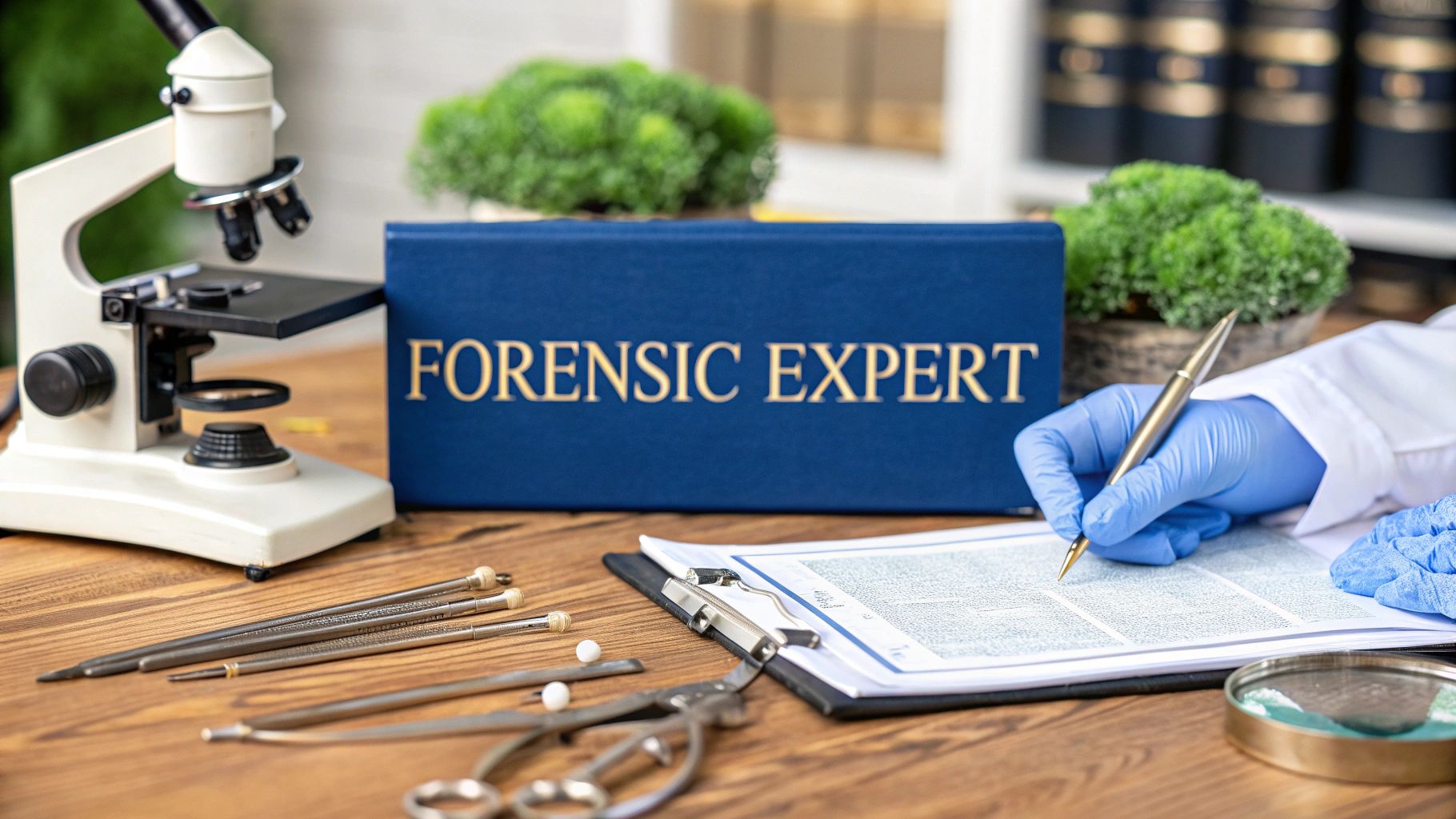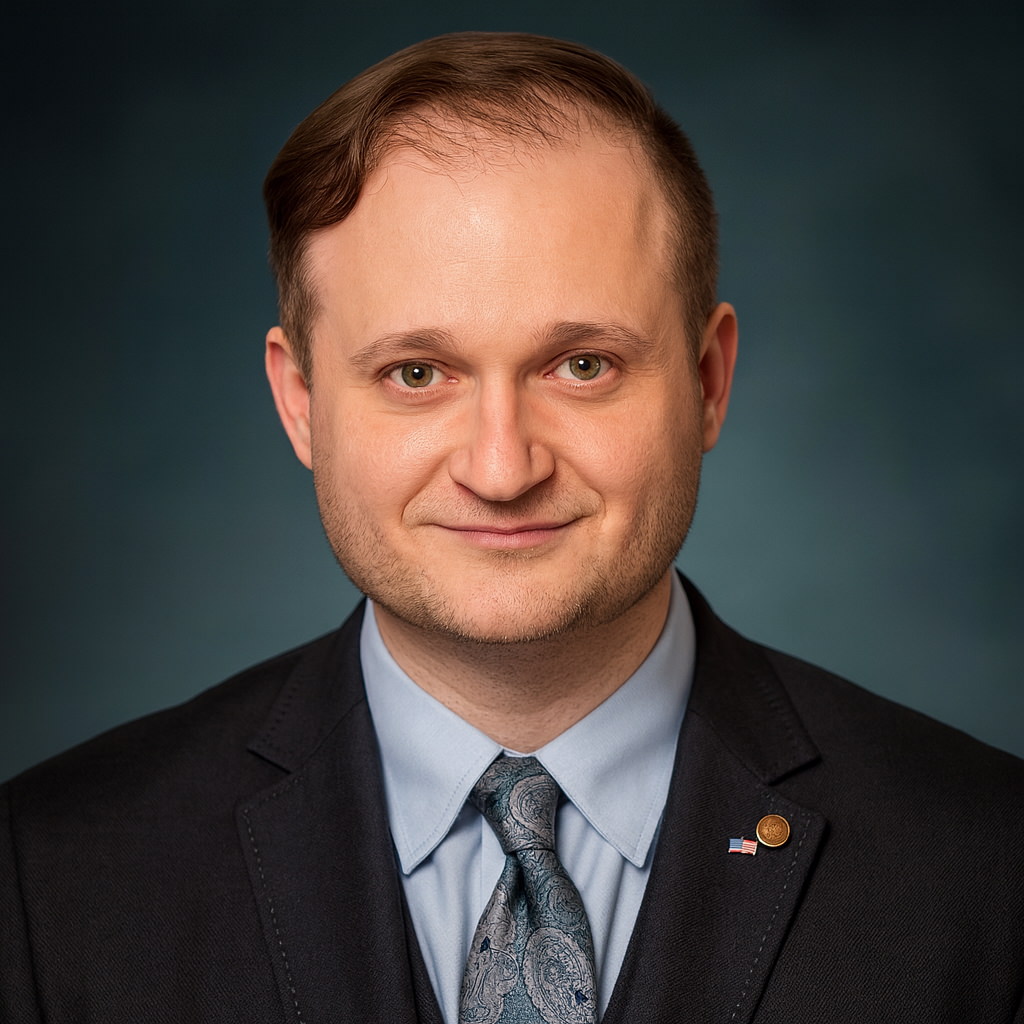When a legal case hinges on how and why a person died, the medical details can be incredibly complex. In these sensitive situations, a forensic pathology expert witness provides crucial clarity. They are highly specialized, board-certified physicians who serve as impartial guides, explaining complex medical evidence to lawyers, judges, and juries.
Their role is not to take sides but to translate the language of medicine into the language of the law, offering clear, scientific opinions on the cause and manner of death.
Bridging the Gap Between the Morgue and the Courtroom
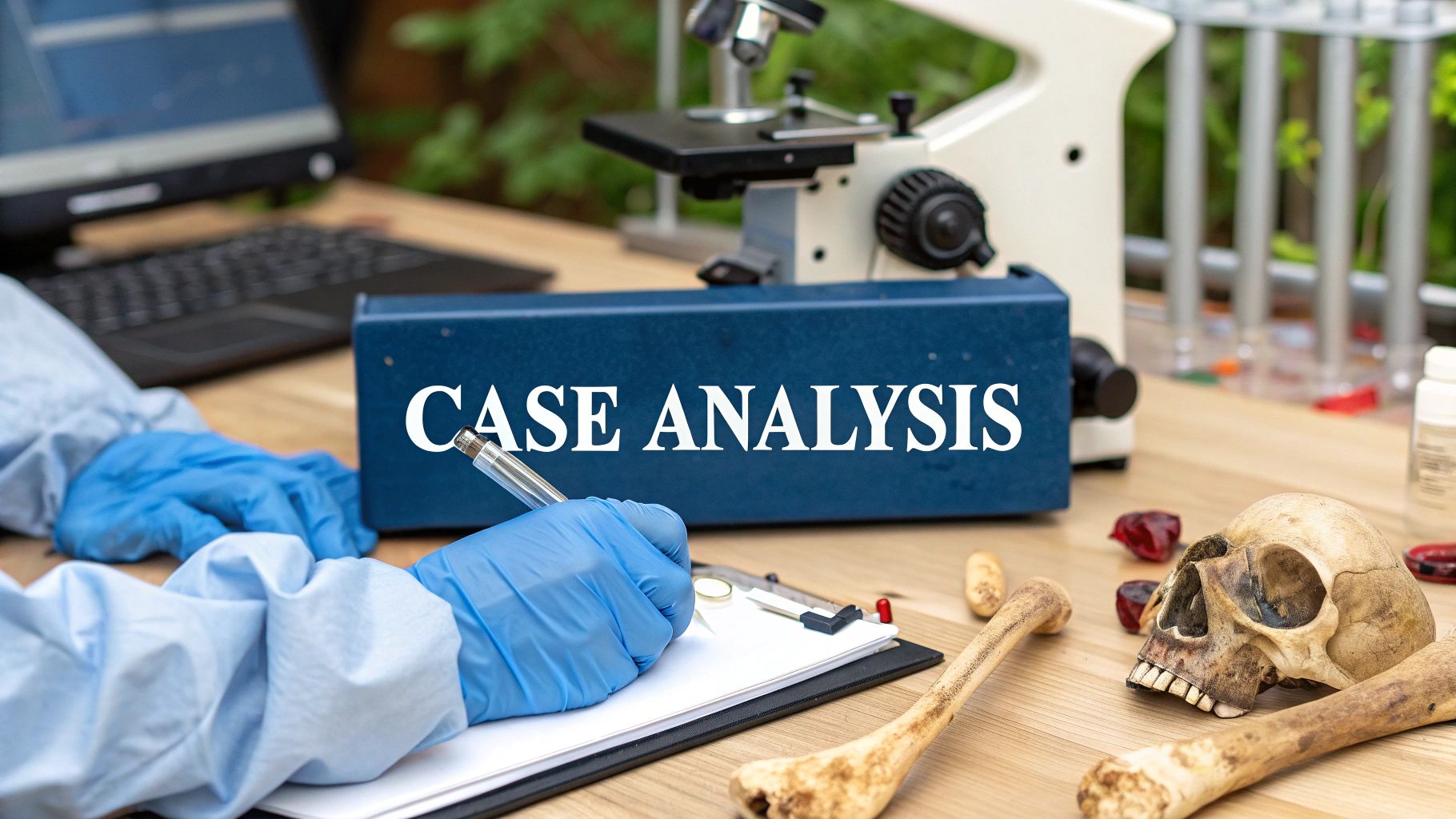
Losing a loved one is a devastating experience, and navigating the legal system that may follow can feel overwhelming. When a death leads to a criminal investigation, a wrongful death lawsuit, or a medical malpractice claim, the need for factual, unbiased answers becomes more critical than ever.
This is the precise role a forensic pathology expert witness fills. They act as a vital link between the sterile, scientific world of the laboratory and the formal environment of a courtroom. A forensic pathologist possesses a unique skill set: they can delve deeply into medical findings and then explain what those findings mean for the legal questions at hand.
What Does a Forensic Pathology Expert Witness Actually Do?
At its core, the expert's work is to interpret the evidence the body provides after death. They carefully review autopsy reports, medical records, toxicology screens, and investigative evidence to form an objective, science-based opinion. It is a meticulous process guided by medical facts, not emotion or allegiance to one side of a case.
Their work provides the foundation for answering the most fundamental questions in a legal matter:
- What was the precise, medical cause of death?
- How can the death be classified (natural, accidental, suicide, or homicide)?
- Did a pre-existing medical condition contribute to the death?
- Is there evidence that a medical professional's actions—or lack thereof—deviated from the accepted standard of care?
By bringing clarity to these points, they help build the factual framework upon which legal arguments rest, ensuring decisions are guided by sound medical science. The information they provide is educational and procedural, not medical advice.
The table below outlines the core duties these experts perform.
Key Responsibilities of a Forensic Pathology Expert Witness
| Responsibility | Description |
|---|---|
| Case Review | Conduct a thorough analysis of all available evidence, including autopsy reports, medical records, toxicology results, and investigative files. |
| Evidence Interpretation | Explain the significance of medical findings, such as injuries or disease processes, in the context of the legal questions being asked. |
| Opinion Formulation | Develop an impartial, scientifically-backed opinion on the cause and manner of death, or other relevant medical issues. |
| Report Preparation | Create detailed, clear, and well-supported written reports that summarize their findings and conclusions for legal teams. |
| Testimony | Provide sworn testimony in depositions or at trial, presenting complex medical concepts in an understandable way for a non-medical audience. |
Ultimately, a forensic pathologist's involvement ensures the legal process is grounded in objective fact.
Bringing Clarity to Complex and Contentious Cases
In wrongful death and medical malpractice cases, a forensic pathologist's testimony can be a deciding factor. By analyzing all available data, they can help determine if a death resulted from natural causes, a tragic accident, or provable negligence. Their unbiased opinion assists the court in establishing facts and assigning liability where appropriate.
This expert analysis is crucial not just for criminal trials but for a wide range of civil matters, including insurance disputes and professional negligence claims. You can find more information about how forensic pathologists support the justice system by providing the objective evidence needed for fair outcomes.
A forensic pathologist’s primary duty is to the evidence. Their role is to present a clear, objective interpretation of medical facts, allowing the legal system to function with a more complete understanding of what occurred. This commitment to neutrality is the cornerstone of their credibility and value.
Engaging a forensic pathology expert witness helps ensure that justice is based on a complete and impartial review of all medical information. They give a voice to the evidence, offering clarity and expertise during what is often a profoundly difficult time for all involved.
What Makes a Forensic Pathology Expert Credible?
Becoming a credible forensic pathology expert witness is the result of a decade or more of intensive education, hands-on training, and an unwavering commitment to scientific rigor. This demanding path ensures their opinions can withstand the toughest scrutiny in a courtroom.
The journey begins with medical school, where earning a Doctor of Medicine (MD) or Doctor of Osteopathic Medicine (DO) degree lays the essential groundwork. This provides a deep, foundational understanding of the human body, disease, and the core principles of medicine.
For a forensic pathologist, however, that is just the starting line.
The Path of Specialization
After medical school, the specialization process begins with a residency in pathology. This is a postgraduate training program lasting four to five years that is dedicated to diagnosing diseases by examining tissues, cells, and body fluids. It is a deep dive into two key areas:
- Anatomic Pathology: The hands-on examination of organs and tissues, often through autopsies and biopsies, to determine the cause of disease or injury.
- Clinical Pathology: This area focuses on laboratory analysis of fluids like blood and urine to uncover evidence of disease, toxins, or other abnormalities.
This dual training provides a comprehensive view of disease, from what is visible to the naked eye to what can only be found under a microscope.
The Fellowship: A Focus on Forensic Reality
With residency completed, the next step is a fellowship specifically in forensic pathology. This training is highly focused. For one to two years, the pathologist works alongside seasoned, board-certified forensic pathologists, usually in a medical examiner's or coroner's office.
This is not about theory; it is about real-world application. Fellows learn to conduct medico-legal autopsies, interpret complex injury patterns, analyze toxicology reports, and, crucially, document every finding with the precision required for legal proceedings.
A forensic pathology fellowship is where a physician truly learns to speak the language of both medicine and the law. It is where one masters the art of not just finding the cause of death, but being able to clearly and defensibly explain those findings to a judge and jury.
This immersive, practical experience is what forges a general pathologist into a forensic specialist.
The Gold Standard: Board Certification
The final seal of credibility is board certification. While technically voluntary, in practice, it is the non-negotiable standard for a top-tier expert. Administered by the American Board of Pathology, this is a significant professional milestone. A pathologist must first be certified in anatomic pathology and then pass another rigorous examination dedicated entirely to forensic pathology.
Board certification acts as the ultimate peer review. It is a clear signal to attorneys, judges, juries, and families that this expert has demonstrated knowledge and competence at the highest level of the profession.
However, the work does not stop there. Maintaining certification requires a lifetime of learning. A forensic pathology expert is constantly engaged in continuing medical education, keeping up with new research, advanced techniques, and the latest scientific discoveries. This dedication ensures their opinion is not only built on a solid foundation but is also informed by the most current science available.
When to Involve a Forensic Pathology Expert
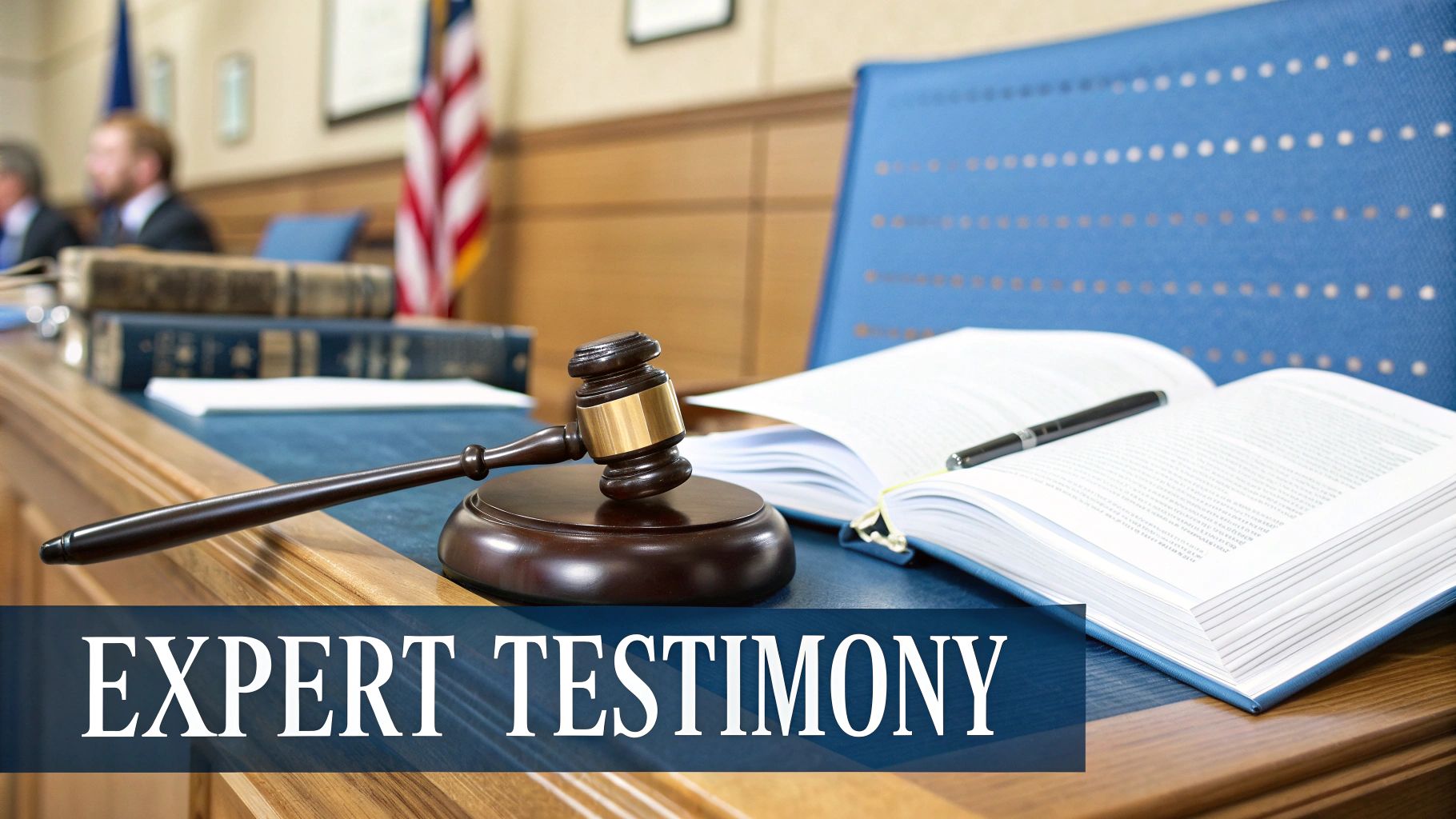
Knowing the right moment to engage a forensic pathology expert can fundamentally change the course of a legal case. This is a strategic step toward obtaining clear, science-backed answers when a situation is clouded by confusion, grief, and conflicting information.
The need for a forensic pathologist is most critical whenever the cause, manner, or circumstances of a death are in question. Their expertise is key to cutting through ambiguity in a wide range of sensitive, high-stakes scenarios. Whether their analysis confirms or challenges initial findings, the ultimate goal is the same: to ensure legal decisions are built on a solid foundation of medical fact.
Civil Litigation Scenarios
In civil law, a forensic pathologist's insights are often the deciding factor in disputes where a death is central to the conflict. These cases carry immense weight, both financially and emotionally, for everyone involved.
- Wrongful Death Claims: If a family believes a loved one’s death resulted from someone else's negligence or intentional harm, an expert can meticulously analyze the evidence to help establish a clear, scientific connection between the other party's actions and the fatal outcome.
- Medical Malpractice Cases: When a patient dies during or after treatment, the question of negligence often arises. A forensic pathologist can help determine if the medical care provided fell below the standard of care and if that failure directly led to the death, separating a tragic but unavoidable outcome from a preventable medical error.
- Workplace Accidents: Following a death on the job, an expert can investigate whether it was caused by unsafe conditions, faulty equipment, or other workplace factors. This is critical for resolving workers' compensation and liability claims.
- Insurance Disputes: If an insurance company denies a claim by citing a policy exclusion, such as suicide, a forensic pathologist can review all available evidence and offer an objective, independent opinion on the manner of death, which can be key to validating the family's claim.
Criminal Investigations and Defense
The role of a forensic pathologist is perhaps most widely recognized in criminal cases, where their work can steer an investigation and heavily influence a trial's outcome.
An expert can be retained by either the prosecution or defense to provide an impartial analysis. The prosecution might engage an expert to reinforce the state medical examiner's conclusions. For a defense team, an independent review could reveal an alternative interpretation of the evidence or expose weaknesses in the original autopsy report.
A second, independent review of forensic evidence is not about creating conflict; it is about ensuring thoroughness. An expert witness provides a crucial layer of verification, confirming that every medical detail has been rigorously examined and correctly interpreted.
This type of independent analysis is fundamental to a fair legal process. The expert’s role is to translate complex medical findings for a jury, explaining everything from injury patterns and time of death estimates to the physiological impact of trauma or toxins in an understandable way.
When a Second Opinion is Necessary
Sometimes, the official autopsy performed by a government medical examiner leaves a family with more questions than answers. The report may feel incomplete, or its conclusions might not align with what the family knows about the circumstances.
In that position, obtaining a second opinion from an independent forensic pathologist is a reasonable and often essential step. You can learn more about the process and benefits of private autopsies for gaining the clarity needed during such a difficult time.
Hiring a forensic pathology expert witness brings a fresh, unbiased set of eyes to the case. They perform a deep re-examination of all available materials: the original autopsy report, photographs, tissue slides, medical records, and police reports. The result is a definitive second opinion that can help provide families with peace of mind and give legal teams the credible evidence needed to pursue justice.
Working with a Forensic Pathology Expert Witness
Engaging a forensic pathology expert witness is not a single event but a collaborative process. It is a journey to uncover the scientific truth behind complex legal questions. Understanding how this process unfolds helps everyone involved—from the legal team to the client—know what to expect.
It begins with an initial consultation. This is a confidential discussion where the legal team outlines the case, the points of contention, and the core questions they need answered. The goal is to ensure the expert’s skill set is the right fit for the specific needs of the case.
If it is a match, the pathologist will then request all relevant documentation. This is the raw material from which they will build their analysis.
The entire process, from the first conversation to the final testimony, follows a logical progression to ensure no stone is left unturned.
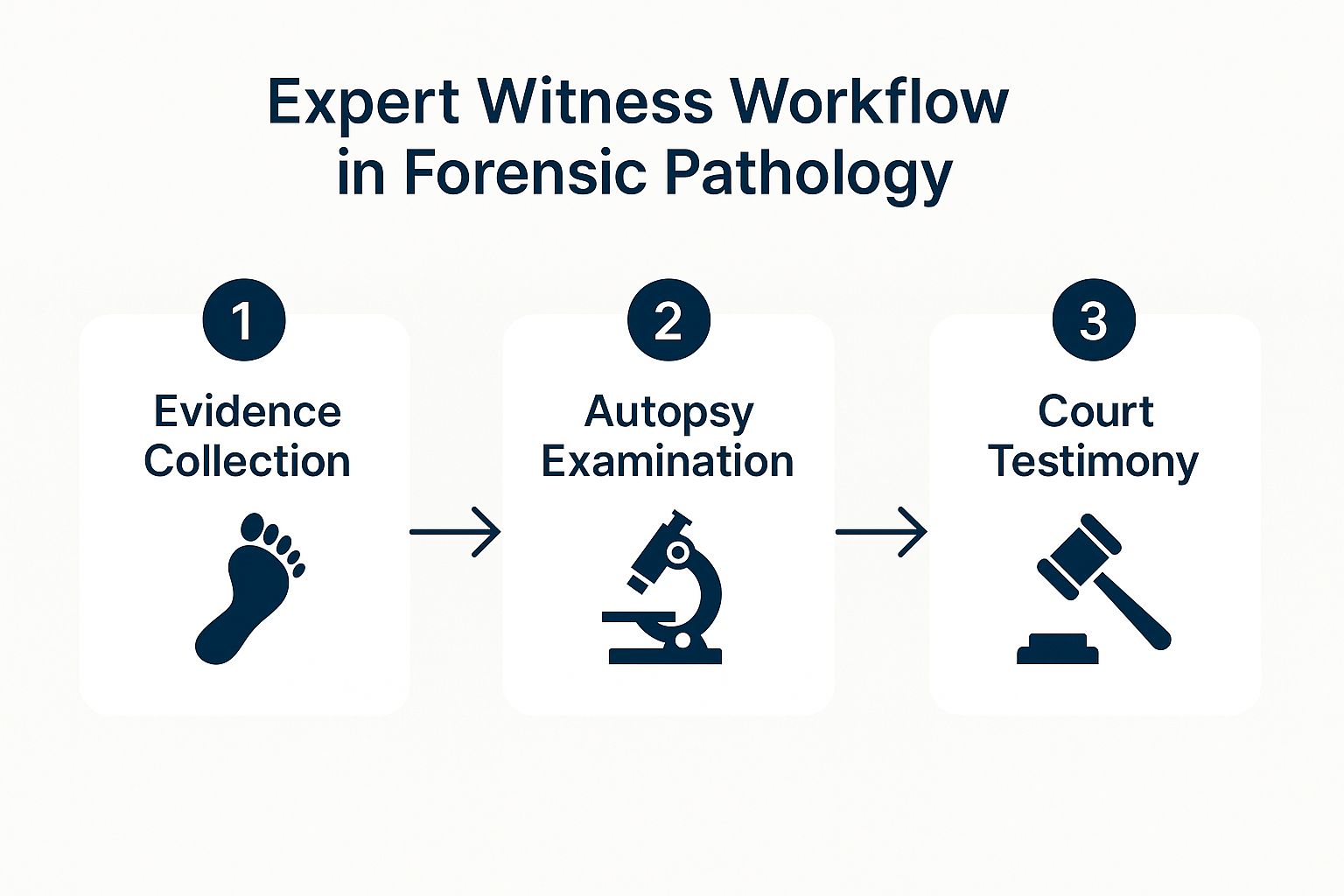
As you can see, each stage builds directly on the one before it, creating a strong, defensible, and thorough final opinion.
The Comprehensive Analysis Phase
With all materials in hand, the real work begins. The comprehensive analysis is where the expert meticulously sifts through every piece of evidence to form an objective, science-based opinion. It is an intensive and detailed process.
This phase typically includes:
- Document Review: A deep examination of autopsy reports, toxicology results, tissue samples (histology slides), and all related medical records.
- Evidence Synthesis: The expert connects the dots, linking an injury noted in the autopsy to a detail from a police report or a witness statement to weave disparate facts into a coherent narrative.
- Opinion Formulation: Based strictly on the evidence, the expert forms a professional opinion on the cause and manner of death or other critical medical questions.
This systematic approach is essential. An expert’s conclusion must withstand intense legal scrutiny, so it must be grounded in scientific fact. According to the National Association of Medical Examiners, thorough peer review is a key component of quality assurance in death investigation (National Association of Medical Examiners, Forensic Autopsy Performance Standards, 2006). This commitment to accuracy is a hallmark of the profession.
Reporting and Testifying
Once the analysis is complete, the expert’s findings are translated into a formal written report. This document is a clear, detailed summary of their entire process: the evidence reviewed, their conclusions, and the scientific reasoning behind them. It is written to be easily understood by legal professionals and often becomes a pivotal piece of evidence.
The expert report is the official record of the pathologist’s findings. It must be clear, concise, and based entirely on the medical evidence. It forms the backbone of any testimony that may follow.
If the case moves forward, the expert then prepares for depositions or trial testimony. This preparation is crucial. The goal is to communicate complex medical concepts in a way that is clear and compelling to a non-medical audience, such as a judge or jury.
With legal proceedings often taking place remotely, understanding how to conduct secure video conferencing depositions for attorneys has become an essential skill to protect the integrity of the testimony. We bring this expertise to communities across Texas, providing vital forensic pathology support where it's needed most. You can see a full list of the Texas counties we serve and how we make our services accessible.
Ethical Duties and Professional Challenges
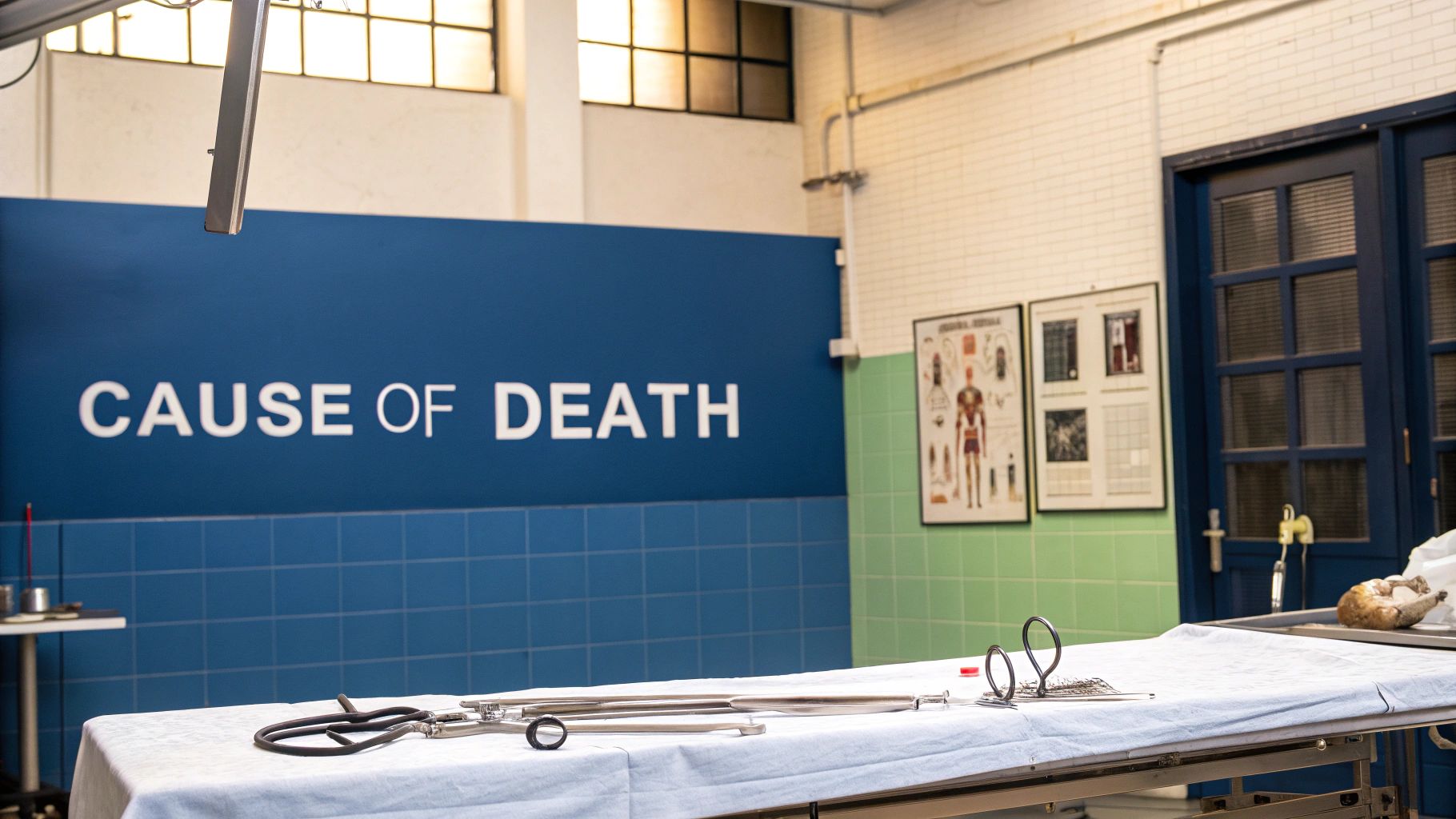
At the heart of a forensic pathologist's work lies an unwavering duty to scientific truth. This role carries immense ethical weight, especially when navigating the emotionally charged landscape of a courtroom. The expert’s primary obligation is to the evidence—not to the party that retained them.
This neutrality is the foundation of their credibility. Whether the findings support or challenge their client’s case, the expert must present them with complete honesty. Their loyalty is to the facts, wherever they may lead.
Ultimately, this commitment to objectivity ensures the legal system receives an unbiased interpretation of complex medical evidence, which is an essential part of reaching a just outcome.
Navigating Pressure and Maintaining Objectivity
Working as a forensic pathology expert witness means operating under intense scrutiny. Attorneys may hope for a specific conclusion, and grieving families are often searching for answers that might bring them peace. The expert must insulate themselves from any pressure, conscious or subconscious, that could cloud their judgment.
Their job is not to be an advocate but to be an educator, explaining the medical facts clearly and impartially. This requires strict adherence to a professional code and reliance on the scientific method to form an opinion.
An expert’s value is directly tied to their impartiality. The moment their opinion is influenced by anything other than the evidence, their credibility dissolves. True expertise demands the courage to present the unvarnished scientific truth, regardless of how it aligns with any party’s expectations.
This steadfast neutrality is what gives their testimony its power, allowing them to serve as a reliable guide for the judge and jury as they work through the complicated details of a case involving a death.
Systemic Challenges in Forensic Pathology
The field is not without its own challenges, which can directly affect how experts perform their duties. In many areas, the death investigation system is strained by high caseloads and other deep-rooted issues.
These pressures are not new. A landmark 2009 report from the National Academy of Sciences, Strengthening Forensic Science in the United States: A Path Forward, highlighted significant deficiencies in the nation’s forensic science system, including shortages of trained and certified medicolegal death investigators. As you can learn by reading more about the challenges facing forensic death investigation systems, these pressures can make it difficult to consistently deliver high-quality forensic expertise.
These external forces make professional resilience and a rock-solid ethical core more important than ever. Despite any systemic hurdles, the mission of the forensic pathology expert witness remains unchanged: to provide clear, objective, and compassionate analysis. This dedication ensures the pursuit of scientific truth remains the guiding light, even in the most difficult circumstances.
Finding Clarity Through Compassionate Expertise
When you are trying to make sense of a loved one's death, particularly when legal questions are involved, the path forward can be uncertain. A forensic pathology expert witness can make all the difference by serving as a scientific guide who can cut through confusion and bring objective clarity to emotionally charged situations.
Their role is to translate complex medical evidence—autopsy reports, medical records, and other key documents—into a clear, understandable narrative for families, lawyers, and the courts. It is about grounding the legal process in solid scientific fact, not speculation. This rigorous commitment to evidence helps provide answers and brings a sense of stability during an incredibly difficult time.
A forensic pathology expert witness provides more than just a medical opinion; they offer a pathway to understanding. Their work is grounded in a deep respect for the deceased and a commitment to providing clear, factual answers for the living.
We understand how sensitive and painful these circumstances are. The search for answers should always be handled with dignity and compassion.
If you have unresolved questions surrounding the loss of a loved one, our team is here to help you confidentially explore your options. You can learn more about how we provide forensic expertise across the state at Texas Autopsy Services. Please do not hesitate to contact us directly by phone or email to discuss your specific needs.
Frequently Asked Questions
When you are dealing with a legal case that involves a death, many questions can arise. This is a complex field, and this section is designed to provide straightforward, educational answers to some of the most common questions about forensic pathology expert witnesses and clarify the vital role they play.
What Is The Difference Between A Coroner And A Medical Examiner?
These roles are often confused, but they are very different. Understanding the distinction is the first step in understanding how a death investigation works.
A coroner is typically an elected official responsible for investigating deaths in their jurisdiction. A coroner is not required to be a physician and often has an administrative role.
A medical examiner is always a physician—specifically, a forensic pathologist—who is appointed to investigate deaths that are sudden, violent, or unexplained. They perform autopsies to determine the medical cause and manner of death.
A forensic pathology expert witness is a board-certified forensic pathologist retained privately by an attorney or family. While a medical examiner works for the government, an expert witness provides an independent, unbiased analysis for a specific civil or criminal case.
What Evidence Does An Expert Witness Review?
A forensic pathology expert conducts a comprehensive review that goes far beyond the initial autopsy report. Their job is to examine every piece of available evidence to form an independent, scientifically-grounded opinion.
This review almost always includes:
- The official autopsy report and all related photographs
- Toxicology reports and laboratory results
- Histology slides (tissue samples viewed under a microscope)
- The deceased's complete medical history from all physicians and hospitals
- Police and scene investigation reports
- Statements from witnesses and deposition transcripts
By synthesizing all of these sources of information, the expert can construct a complete narrative of what happened, often identifying crucial details that can be pivotal to a case.
Does The Expert Always Have To Testify In Court?
No. While experts are often pictured on the witness stand, much of their most critical work occurs long before a trial begins.
The process starts with a thorough case review, which culminates in a detailed expert report. This document clearly lays out the pathologist's findings and the scientific reasoning behind them. In many civil cases, this report is so authoritative that it can help both sides reach a fair settlement, avoiding the time and expense of a trial.
The initial analysis and written report from a forensic pathology expert witness can be instrumental in resolving a case. By providing objective, evidence-based clarity early on, their work often facilitates resolution without a court appearance.
Of course, if a case does proceed to trial, the expert is prepared to provide clear, compelling testimony. However, their upfront analysis is often what helps avoid the courtroom altogether.
How Does A Second Opinion Differ From The Initial Autopsy?
Obtaining a second opinion from an independent forensic pathologist is not about questioning the competency of the original autopsy. It is about ensuring every angle has been considered and every piece of evidence has been thoroughly examined.
Often, the consulting expert has the benefit of additional information that was not available to the original examiner, such as newly discovered medical records or legal documents. This allows for a broader, more complete analysis. The expert will meticulously review the original autopsy report, photos, and tissue samples to determine if subtle clues were overlooked or if the evidence could support a different, scientifically valid conclusion. This fresh perspective can either confirm the initial findings or uncover new insights essential for reaching the truth and providing a family with peace of mind.
We understand that seeking answers after a loss is an incredibly difficult and emotional process. At Texas Autopsy Services, our goal is to provide clarity with compassion and professionalism.
If you have questions about private autopsy services or need the expertise of a forensic pathologist, you may contact our team directly by phone or email. We are here to help you understand your options in a confidential and respectful manner. For more information, please visit us at https://www.texasautopsyservices.com.
